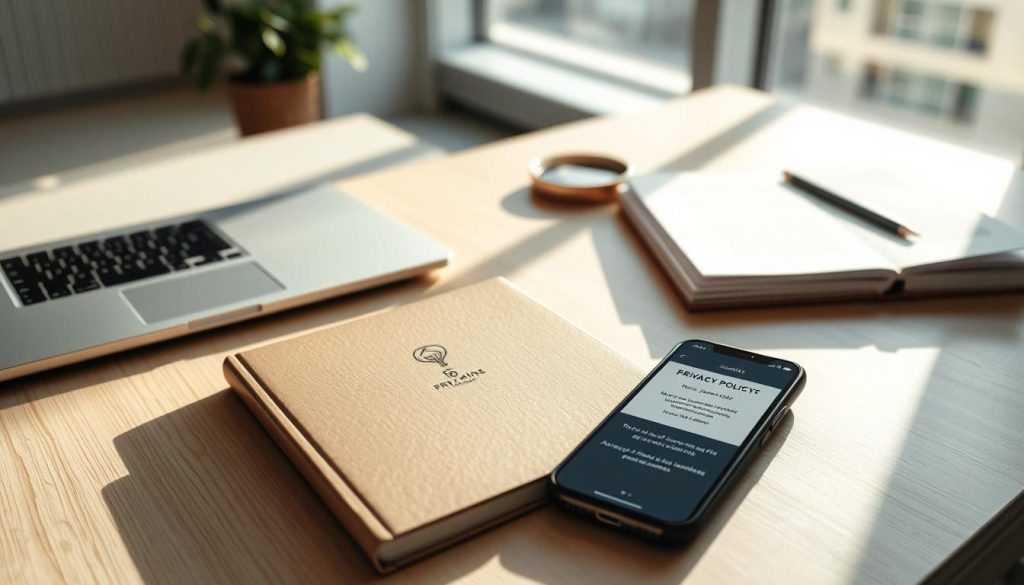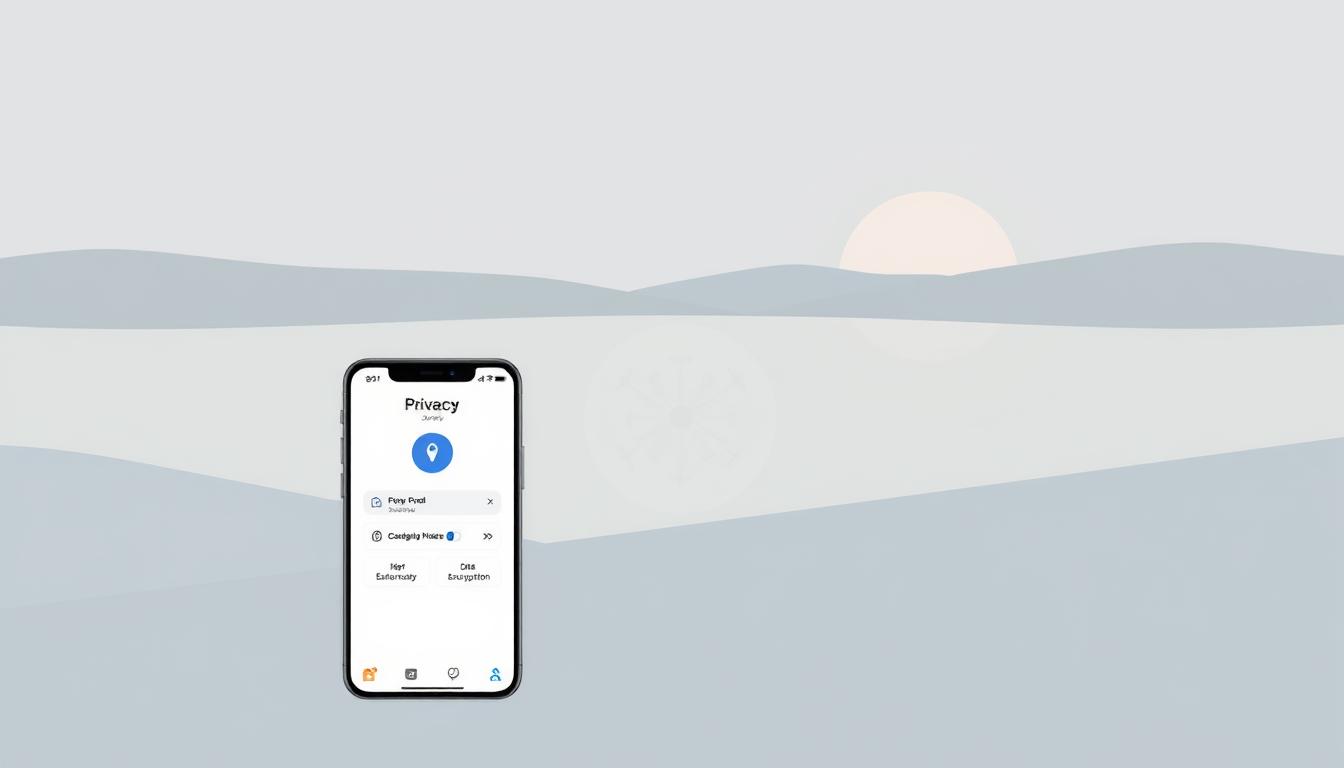Your personal thoughts are precious in today’s digital world. Privacy seems to be disappearing, but your journal entries need strong protection. The General Data Protection Regulation (GDPR) is like a digital bodyguard for your thoughts.
Did you know many users worry about their journal privacy? It’s true. GDPR journaling apps now protect your entries from unwanted access. This way, your stories stay just for you.
Privacy is not just a nice-to-have anymore; it’s a basic right. Secure apps must follow strict rules to keep your digital life safe. If they don’t, over 50% of users might leave.
Understanding GDPR’s role in your digital life is key. This guide will show how GDPR changes your journaling experience. It puts you back in control.
Understanding GDPR Fundamentals for Digital Journal Users
Digital journaling has changed how we write down our thoughts. But, it also means we must protect our notes. The General Data Protection Regulation (GDPR) helps keep your data safe. It tells apps how to handle your private info.
Knowing your rights is key when using digital journals. GDPR sets rules for handling your data. This makes sure your thoughts stay safe and yours to control.
Key GDPR Principles for Personal Data Protection
GDPR has basic rules for keeping data safe:
- Data must be collected legally and clearly
- It should be used for specific, good reasons
- Only collect what’s needed
- Keep data accurate
- Don’t store data for too long
Your Rights as a Journal App User Under GDPR
GDPR apps must respect your rights, including:
- Right to see your data
- Right to fix any mistakes
- Right to delete your data
- Right to limit how data is used
- Right to take your data with you
Consent Requirements for Data Processing
Apps need clear consent to use your data. You must agree to how your data will be used. You can also change your mind anytime.
“Your data, your control” is the fundamental principle of modern digital privacy protection.
Learning about GDPR helps you choose safe digital journals. This way, you can protect your personal data better.
GDPR Journaling Apps: Security Requirements and Compliance

Keeping your personal info safe in digital journals is key. Digital privacy tools are essential for keeping your deepest thoughts private.
GDPR sets strict rules for apps that handle personal data. Your digital safety relies on strong protection that keeps your writing safe from hackers.
“Privacy is not something that I’m merely entitled to, it’s an absolute prerequisite.” – Marlon Brando
Key Security Requirements for Journaling Apps
- End-to-end encryption for journal entries
- Two-factor authentication
- Secure data storage practices
- Data anonymization techniques
The best digital privacy tools use many layers of protection. Your personal info must be encrypted both at rest and in transit to keep it safe.
| Security Feature | Protection Level |
|---|---|
| End-to-End Encryption | High |
| Multi-Factor Authentication | Very High |
| Data Anonymization | Medium |
Companies with strong security measures are 30% less likely to have data breaches. Choose a journaling app that focuses on these important security steps.
Your digital journal holds your most personal thoughts. Pick an app with strong GDPR-compliant security to keep your thoughts safe and private.
Privacy Labels and Transparency in Journal Applications
Digital privacy is now a big deal for journaling app users. With new data protection laws, app stores have created tools to show how your info is used.

Understanding App Store Privacy Labels
Privacy labels give you a clear view of how apps use your data. Apple and Google made these labels to help you see how your info is handled. Here are some interesting facts about these labels:
- Apple introduced privacy labels in December 2020
- Google followed with Data Safety Sections in April 2022
- A total of 2,502,728 apps were analyzed across both platforms
Mandatory Privacy Policy Requirements
GDPR rules make journaling apps be very open about your data. They must tell you:
- What data they collect
- Why they process your data
- Your rights to see and delete your data
Data Processing Disclosures
Studies found big issues with how data is protected. Surprisingly, 68.6% of apps claiming no data collection actually sent info to tracking sites. This shows why it’s key to check privacy policies carefully.
“Your data privacy is not just a feature, it’s a fundamental right.” – Privacy Advocate
| App Store | Total Apps | Apps with Privacy Labels |
|---|---|---|
| Apple App Store | 845,375 | 60.5% |
| Google Play Store | 1,657,353 | 59.8% |
By knowing about these privacy labels, you can choose journaling apps that protect your data and respect your rights.
Data Breach Protection and User Safety Measures

Digital journaling is convenient, but keeping your data safe is key. The General Data Protection Regulation (GDPR) sets strong online safety rules. These rules protect your personal info from breaches.
Your data’s safety relies on several important steps:
- Mandatory breach notification within 72 hours
- Comprehensive data protection protocols
- Regular security audits
- Encryption of personal information
GDPR requires journaling apps to use data protection by design. This means they must actively protect your data, not just wait for threats.
“Your privacy is not a luxury, it’s a right.” – GDPR Principle
Legal rules for data protection include:
| Protection Measure | User Benefit |
|---|---|
| Encryption | Prevents unauthorized access |
| Access Controls | Limits data exposure |
| Regular Audits | Identifies possible weaknesses |
Knowing these protection methods lets you use digital journaling safely. You can keep your personal info under your control.
Implementing Data Protection in Your Digital Journaling Practice
When picking a digital journaling platform, choose GDPR-friendly apps that protect your data well. Look for services with strong encryption to keep your notes safe. Make sure to check the app’s security features before you start.
Compliant journaling means managing your digital footprint well. Use strong, unique passwords and two-factor authentication if you can. Check your privacy settings often to keep your sensitive thoughts safe. Some apps let you control who sees your journal.
Digital journaling is great for tracking your mental health, with 80% of people preferring it over paper diaries. By using apps that follow data protection rules, you can safely track your emotions. You’ll also have full control over your personal info.
Don’t forget to check your journal entries and delete old ones. Most GDPR-compliant apps make it easy to manage your data. Your digital journaling should help you explore your thoughts while keeping your data safe.
FAQ
What is GDPR and how does it impact my journaling app?
What personal rights do I have under GDPR when using a journaling app?
How can I ensure a journaling app is GDPR-compliant?
What type of security features should a GDPR-compliant journaling app have?
Can I delete my journal entries completely under GDPR?
How do privacy labels help me choose a GDPR-compliant journaling app?
What happens if my journaling app experiences a data breach?
Can I transfer my journal entries between different apps?
Source Links
- Talking Privacy of Journaling Apps
- Top 5 Best GDPR-Compliant Analytics Tools for Mobile Apps
- How does the GDPR affect email? – GDPR.eu
- How we apply GDPR in our user research: 5 key takeaways | Ostmodern
- Exploring the Effects of GDPR on the User Experience
- Akazio for RingCentral
- 6 Technologies You Need to Comply with Data Privacy Laws
- JACE Compliance System | MailSPEC
- The death of privacy policies: How app stores shape GDPR compliance of apps
- Examining the Integrity of Apple’s Privacy Labels: GDPR Compliance and Unnecessary Data Collection in iOS Apps
- GDPR-compliant services for businesses – GDPR.eu
- 2020 Volume 3 Practical Data Security and Privacy for GDPR and CCPA
- Before and after GDPR: tracking in mobile apps
- Digital Journaling: Enhancing Therapeutic Reflection with Diary Apps | Therapy Trainings™
- 5 Apps for Symptom Diary & Health Journaling (2020)

